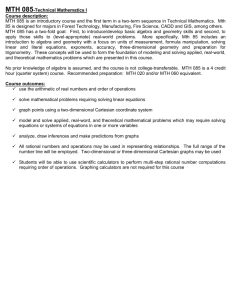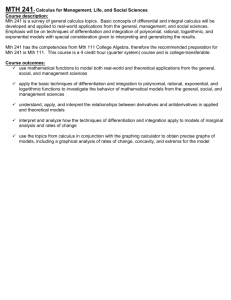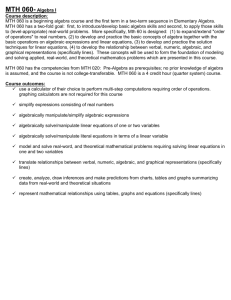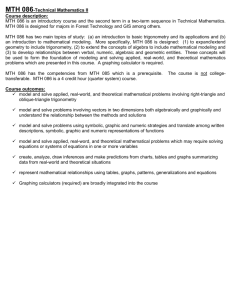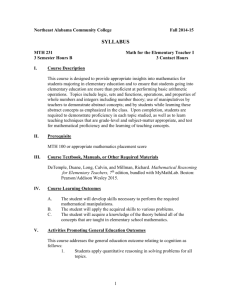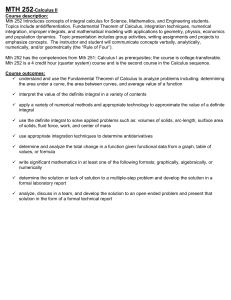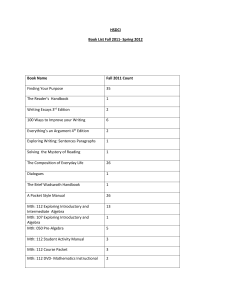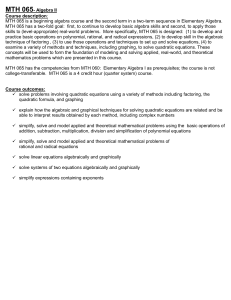2001-05-01
advertisement
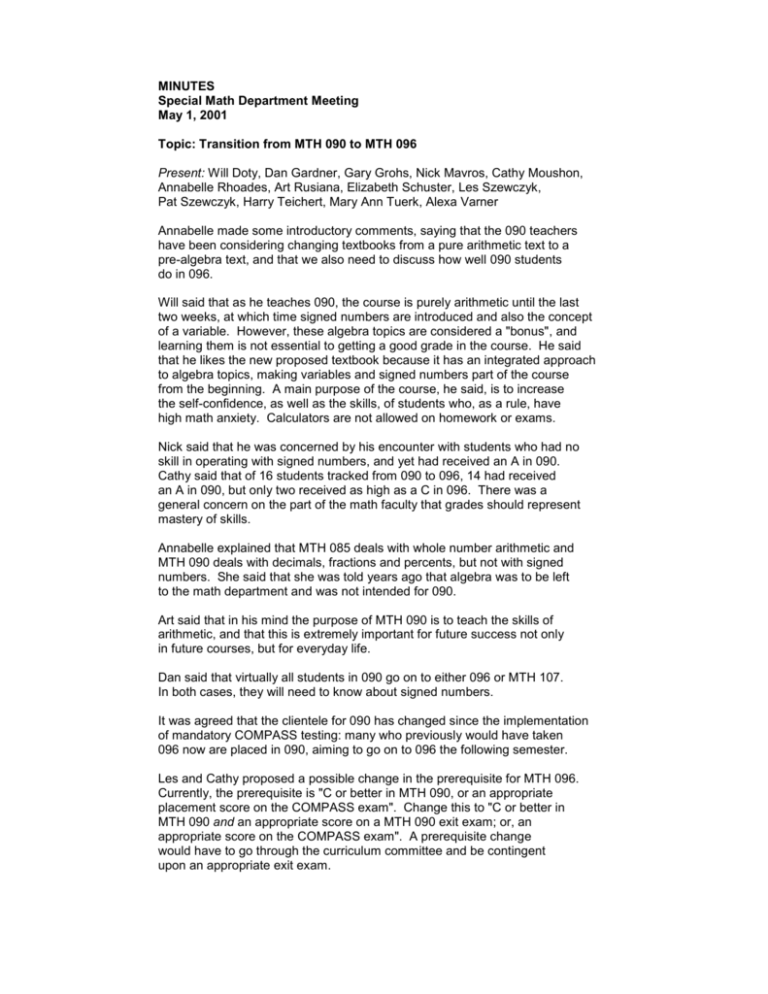
MINUTES Special Math Department Meeting May 1, 2001 Topic: Transition from MTH 090 to MTH 096 Present: Will Doty, Dan Gardner, Gary Grohs, Nick Mavros, Cathy Moushon, Annabelle Rhoades, Art Rusiana, Elizabeth Schuster, Les Szewczyk, Pat Szewczyk, Harry Teichert, Mary Ann Tuerk, Alexa Varner Annabelle made some introductory comments, saying that the 090 teachers have been considering changing textbooks from a pure arithmetic text to a pre-algebra text, and that we also need to discuss how well 090 students do in 096. Will said that as he teaches 090, the course is purely arithmetic until the last two weeks, at which time signed numbers are introduced and also the concept of a variable. However, these algebra topics are considered a "bonus", and learning them is not essential to getting a good grade in the course. He said that he likes the new proposed textbook because it has an integrated approach to algebra topics, making variables and signed numbers part of the course from the beginning. A main purpose of the course, he said, is to increase the self-confidence, as well as the skills, of students who, as a rule, have high math anxiety. Calculators are not allowed on homework or exams. Nick said that he was concerned by his encounter with students who had no skill in operating with signed numbers, and yet had received an A in 090. Cathy said that of 16 students tracked from 090 to 096, 14 had received an A in 090, but only two received as high as a C in 096. There was a general concern on the part of the math faculty that grades should represent mastery of skills. Annabelle explained that MTH 085 deals with whole number arithmetic and MTH 090 deals with decimals, fractions and percents, but not with signed numbers. She said that she was told years ago that algebra was to be left to the math department and was not intended for 090. Art said that in his mind the purpose of MTH 090 is to teach the skills of arithmetic, and that this is extremely important for future success not only in future courses, but for everyday life. Dan said that virtually all students in 090 go on to either 096 or MTH 107. In both cases, they will need to know about signed numbers. It was agreed that the clientele for 090 has changed since the implementation of mandatory COMPASS testing: many who previously would have taken 096 now are placed in 090, aiming to go on to 096 the following semester. Les and Cathy proposed a possible change in the prerequisite for MTH 096. Currently, the prerequisite is "C or better in MTH 090, or an appropriate placement score on the COMPASS exam". Change this to "C or better in MTH 090 and an appropriate score on a MTH 090 exit exam; or, an appropriate score on the COMPASS exam". A prerequisite change would have to go through the curriculum committee and be contingent upon an appropriate exit exam. There was a consensus that this idea was worth pursuing. Annabelle said that during the coming year, the 090 teachers would pilot the use of the new pre-algebra text, using an exit exam, agreed on by all math math faculty, that would test for pre-algebra/algebra skills. ANABELLE'S NOTES: Math Meeting - 5/1/01 Mth090 faculty will pilot new pre-algebra text and exit exam in Fall/Spring 2001/2002 in all sections of the course. All Math faculty will collaborate on the exit exam. Math096 faculty will consider pre-req change to say "C or better in Mth090 and appropriate score on exit exam, or appropriate score on placement test." I will see those students who pass one piece, but not the other. Students who pass neither one should see a counselor about the possibility of Mth107 instead of 096, or stopping out of math. Mth090 will still emphasize mastery of arithmetic concepts of fractions, decimals, and percents. Less time will be spent on decimals and percents than in the past. The course will begin to integrate properties and order of operations of signed numbers into the mastery of arithmetic. It will introduce the concepts of variables and evaluation of expressions. The philosophical focus of the class is to reduce math anxiety, test anxiety, encourage students to believe they can be successful at math, and reward them for what they learn and can demonstrate, without punishing them for what they cannot. Mathematical terminology is taught and used, so that students can become comfortable with the "language of math" and are prepared for this when faculty use the terminology in higher level classes.
